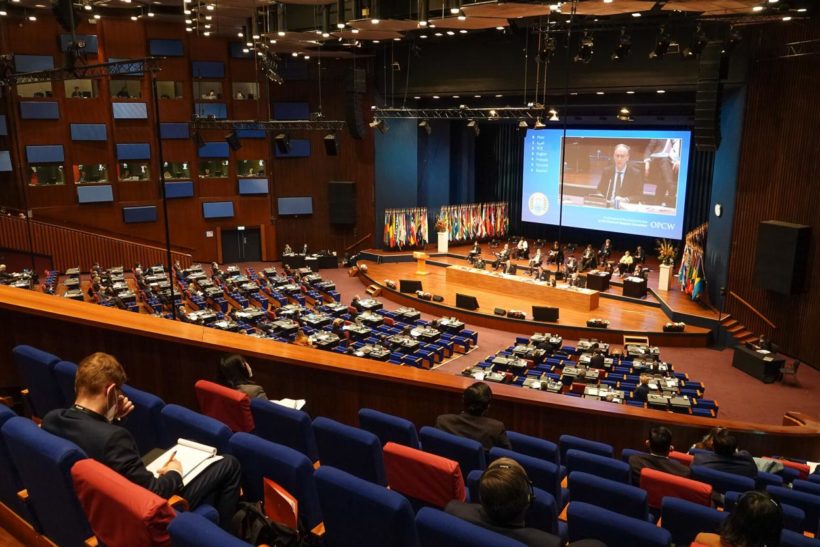- Member States meet for annual conference to review progress in implementing the Chemical Weapons Convention, address challenges, and set strategy for coming year
The Twenty-Sixth Session of the Conference of the States Parties to the Chemical Weapons Convention (CSP-26) opened yesterday in The Hague, Netherlands. This week, Member States of Organisation for the Prohibition of Chemical Weapons (OPCW) will assess progress in the implementation of the Chemical Weapons Convention (CWC) and mark the path forward.
The Conference is being chaired by the Permanent Representative of Norway to the OPCW, H.E. Mr Bård Ivar Svendsen, who assumes his duties from the outgoing Chairperson, H.E. Ambassador José Antonio Zabalgoitia Trejo of Mexico.
During the proceedings, the delegates will discuss and offer recommendations for enhancing the OPCW’s work in the areas of verification, assistance and protection, international cooperation, capacity development, and outreach. The delegates will also decide on the Organisation’s programme and budget for 2022 and 2023.
In his opening statement, the Director-General underscored the importance of strengthening the Organisation’s focus on preventing the re-emergence of chemical weapons, declaring: “even after the end of destruction, the OPCW’s mission will be far from finished. For the past years, the Secretariat has been adapting to face new threats posed by the evolving security landscape.”
The Director-General thanked Conference delegates for the support and financial contributions to the new ChemTech Centre. He remarked that the Centre will be “an essential tool in the efforts to face the new and demanding situation”.
On Tuesday, the Day of Remembrance for All Victims of Chemical Warfare will be observed. The Conference will reaffirm its commitment to the norm against chemical weapons in all circumstances. Director-General Arias underlined the OPCW’s solidarity with victims and its “ongoing commitment to exclude completely the possibility of the use of chemical weapons.”
Conference participants include OPCW Member State delegations and representatives from a signatory state, as well as representatives from international organisations, the chemical industry, and civil society.
Background
The Conference of the States Parties meets annually to assess the implementation of the Chemical Weapons Convention (CWC) and to make key decisions regarding the future work of the Organisation. The Conference of the States Parties oversees the continued implementation of the Chemical Weapons Convention, the promotion of the treaty’s objectives and reviews international compliance with the treaty. The Conference is attended by representatives of all Member States of the OPCW, each of which has one vote.
As the implementing body for the Chemical Weapons Convention, the OPCW, with its 193 Member States, oversees the global endeavour to permanently eliminate chemical weapons. Since the Convention’s entry into force in 1997, it is the most successful disarmament treaty eliminating an entire class of weapons of mass destruction.
Over 98% of all declared chemical weapon stockpiles have been destroyed under OPCW verification. For its extensive efforts in eliminating chemical weapons, the OPCW received the 2013 Nobel Peace Prize.










